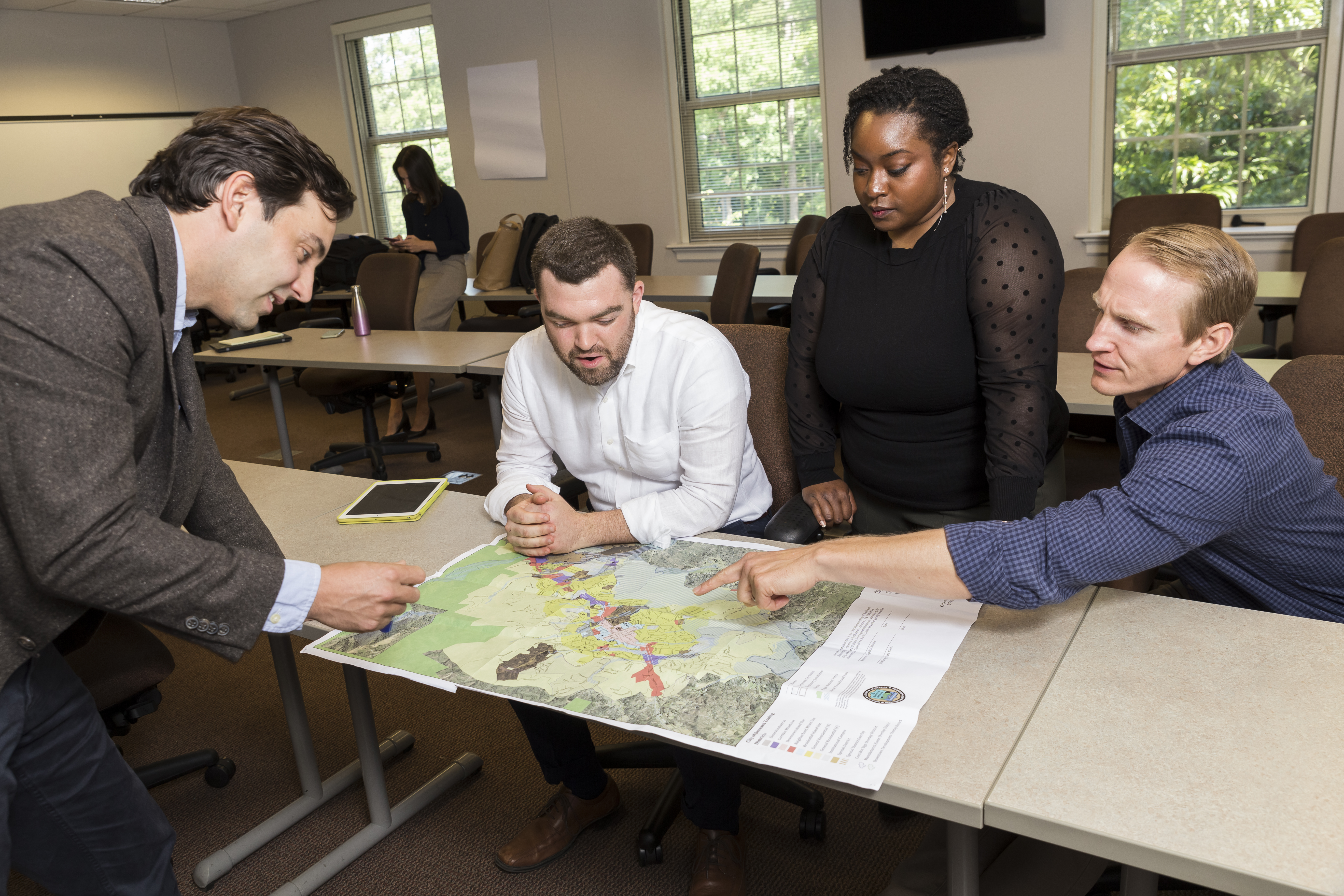Transformative Learning: The Impact of DFI’s Class on Community Development
Since 2013, during both the fall and spring semesters, DFI staff have led interdisciplinary teams of UNC graduate students on a journey throughout the state, learning what it takes to transform vacant buildings in small-town North Carolina into occupied, vibrant spaces. Commonly known as “The DFI Class”, Community Development & Revitalization Techniques is an experiential course that pairs student teams with local government clients that have real-life revitalization projects. Under the guidance of DFI Lead Faculty member Tyler Mulligan and DFI staff experts, students perform pre-development feasibility analysis for projects ranging from the redevelopment of historic Rosenwald School into affordable senior housing in Clinton, to reimagining a new commercial future for a former jail in downtown Wilkesboro. Students gain technical skills in financial modeling, data analysis, market research, and GIS, using those skills to evaluate whether a redevelopment project would attract private investment and, if not, how a public-private partnership might enhance its feasibility. So far, approximately 160 students have taken the course, which has earned the reputation as the toughest and the most rewarding class currently offered to UNC-Chapel Hill graduate students interested in careers in community development.
DFI Project Manager Sara Van Lear took the course as a student in 2015 and reflected on why the class was so challenging: “It was the hardest class I took in grad school because of its dual nature: the technical skills you’re learning alongside the real-life accountability of the class. You’re not just absorbing new concepts; you’re immediately applying them to decisions you’re making that influence the next step in analysis. It felt like the stakes were higher.”
DFI Senior Analyst Frank Muraca, who now teaches market analysis in the course, agrees with Sara when reflecting on his experience taking the class in 2018. Muraca shares that “what was really mind-blowing was that it introduced me to an issue and area of expertise that I didn’t know existed, but once I knew, it was immediately recognizable all over the place: how things get built and how the local government can facilitate that process. The class made that world accessible and grounded it in reality. And because I was working on an actual project, it felt like I was learning not just the skills themselves but how to talk about it and the limitations of analysis.”
Translating real estate development to diverse audiences
Knowing “how to talk about it” is an essential skill set the DFI team uses in their work every day, and teaching students in the class provides staff with an opportunity to reinforce that skill. Much of DFI’s work involves building the capacity of local government staff to understand how real estate works and why the public sector can play a valuable role. “Keeping that educational lens fresh by teaching students makes our DFI work more effective—we have to teach these concepts to clients all the time,” said Muraca. “The class forces us to think about how we deliver these ideas and what questions we’re likely to be asked.”
The course provides additional benefits to DFI outside of the classroom. Through the course, DFI can build relationships and serve more communities than it otherwise could through its professional advising services. Since the class’s inception, student teams have analyzed 45 distinct revitalization projects that otherwise weren’t good candidates for DFI professional services, usually because of issues related to site control, political will, or cost. Some class projects may eventually become DFI professional projects or, through the relationship cultivated through the course, local governments learn more about DFI services and become clients.
In addition to fostering connections with local government staff, DFI is also able to build relationships with students—future colleagues—through the class and through its Community Revitalization Fellows internship program. The class is a “feeder system” for the DFI Fellows program, which provides students with practical experience assisting DFI projects. Every single member of DFI’s current staff came through this pipeline, either taking the course and/or serving as a DFI Fellow while in graduate school.
The future is interdisciplinary
Perritt says that, through the class, “DFI is able to influence the pipeline of future real estate developers in North Carolina by exposing community-minded students to the field.” Some students begin the course already on a career path in community development and public service; sometimes the class provides an entry point into the field. Even if the students don’t enter the development field upon graduation, takeaways from the course often serve them well in careers in the public sector. For example, Stephanie Watkins-Cruz, a UNC MPA alum who took “The DFI Class” not once but twice, is now the Director of Policy for the North Carolina Housing Coalition after spending several years in a local government leadership role with Chatham County. Ricky Ruvio, another UNC MPA Alum who took the class and served as a DFI graduate student Fellow, has worked with the City of Winston-Salem for five years. And the list goes on. DFI Assistant Director for Housing and Revitalization Sarah Odio, who teaches financial modeling and feasibility analysis in the course, puts it this way: “It’s great to know and interact with former students working for local governments and nonprofits around North Carolina who have taken the class and are now armed with the lens of community-driven real estate development.”
###
If you have a project in your community and would like to enlist the help of UNC graduate students in the Community Development & Revitalization Techniques, submit your project online at: https://dfi.sog.unc.edu/projects/submit-community-revitalization-projects-for-grad-students/.
Published October 17, 2024



